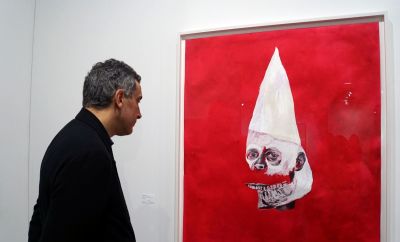Identity politics on the right

The recent controversy surrounding Thomas Achord, a classical Christian school headmaster exposed for running a white supremacist Twitter account, has proved instructive on a number of fronts. It demonstrates that real racism and white supremacy do exist, a point that the grade inflation to which these terms have been subjected by the professional anti-racists of the last few years has served only to obscure. We must not allow the trivialization of racism to blind us to the places where it actually is. It is also a reminder that a radical right that cannot effectively operate a pseudonymous Twitter account is unlikely to be seizing control of America by force any time soon.
The views Achord and his Twitter cronies expressed were vile; their impotent online posturing unintentionally comedic. And then there was the personal abuse to which Alastair Roberts, the man who exposed the situation, was subjected by professing Christians — a reminder that for some Protestants, all Scripture is inspired and perspicuous, but some parts (e.g., the imprecatory bits) are apparently more inspired and perspicuous than others (e.g., the references to kind words deflecting wrath, turning the other cheek, observing the Ninth Commandment, and those pesky sections on not insulting brothers in the faith).
Beyond the bluster, though, two other issues struck me as noteworthy. First, it is clear that identity politics has a home on the reactionary right just as it does on the progressive left. This is no real surprise: In a world where everything has become politicized, such a scenario was bound to come to pass. The danger for Christians is that the apparent polarizing of society makes the stakes of political debates seem extremely high. In such a situation, extreme positions become attractive, even irresistible. As otherwise ordinary Christians see the country slipping away from them and into the hands of those whose culture war seems to have no moral limits, there is a temptation to repay like with like and to become the mirror image of the other side. This has to be resisted. And that resistance has to start in the pulpit, where the tone and direction are set for Christians in the pews.
Some may resist and argue that this is to bring politics into the pulpit. Unfortunately, in a world where everything is political, everything said in the pulpit is already political to some degree. And as we live in a world where the central contested political questions of our time all connect to the question of what it means to be human, then everything has to be political at some level. Now, this is not to say that preaching should be party-political, nor that its primary focus should be this world rather than the next. But it is to say that, after the commandment to love God, the commandment to love one’s neighbor is next in order of importance. And loving one’s neighbor — knowing how to live in the polis — is political. Thus, if there is in Christ no Jew or Gentile, then the racism of the right and of the left has no place in the Church.
The second issue that the Achord controversy touched to some extent is that of Christian nationalism. The term itself seems rather slippery, covering everything from hard-right racism to what many of us would simply have regarded as old-fashioned patriotism. In this context, a recent essay by Brad Littlejohn is a most welcome and helpful intervention. Until there is a stable and agreed-upon definition, “Christian nationalism” seems likely to function for the left as “cultural Marxism” does for the right: a convenient pejorative for discrediting that person just to the right — or the left — of what you yourself find acceptable.
Here it might be useful for Christians of all sides to rehabilitate the term “patriotism.” Unlike many Americans, it seems, I (along with thousands of other immigrants and aspiring immigrants) actually think America is on the whole a basically good country and one that her citizens should love. There is nothing wrong with that, because love for one’s country does not logically entail that one must despise and look down on all others. Christian patriotism avoids that. Take marriage as an analogy. If a husband declares his wife to be the most beautiful woman in the world, he is not saying that every other woman is ugly. What he is actually doing is expressing his special love for her and his deep gratitude for the joyful companionship she brings to his life. To love one’s country, to be patriotic, is thus not to sneer at every other nation or to look with scorn upon other peoples. It is simply the appropriate response of gratitude and love for the place where one belongs, that gives one an identity, that provides one with community and with purpose. Seen in that light, to be unpatriotic or to espouse chauvinistic nationalism are both morally wrong.
The tawdry Achord affair has revealed an ugly side to a certain part of the American Christian world. Real white supremacy really exists and is a real sin. It requires real action and real repentance from those Christians who espouse it. But in reacting to this, we need to be careful not to fall into the sin of ingratitude for other things — such as the country, warts and all, that we call home.
Originally published at First Things.
Carl R. Trueman is a professor of biblical and religious studies at Grove City College. He is an esteemed church historian and previously served as the William E. Simon Fellow in Religion and Public Life at Princeton University. Trueman has authored or edited more than a dozen books, including The Rise and Triumpth of the Modern Self, The Creedal Imperative, Luther on the Christian Life, and Histories and Fallacies.





















